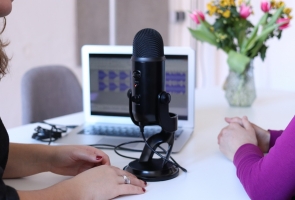Podcast advertising is an interesting and underutilized advertising medium for real estate agencies and companies like yours. If you’re looking to start sponsoring podcasts — or for an effective way to help boost your in-show marketing efforts — knowing how to write good ads is mandatory.
Knowing how to approach your audience and making your ad content equally as engaging as your show content takes talent. It relies on the talent of both the host(s) and the person or people who write the ad.
If I had to guess, I’d imagine you landed on this article for one of two distinct purposes. Either you currently produce a podcast in this niche or you’re an agent looking to break into advertising on podcasts in specific niches. Some lucrative ones for advertising real estate services include:
• Home Improvement and DIY
• Personal Finance
• Family Planning and Parenting
• Construction
Where you advertise will have a direct impact on the tone and style of your ads. Knowing your audience as well as you do, this is probably something you already know. The real question is whether your messaging is engaging enough to motivate people to follow your calls to action. Taking your cues from the below strategies and guidelines is a terrific way to boost engagement. Working with a real estate content marketing agency with writers who already know how to implement them is an even better option.
Think ‘Radio-Style Messaging’
Podcast and radio ads have quite a bit in common. They rely heavily on the listener’s attention and imagination to round out the message. This is why radio ads are always marketing-heavy. They have a limited — and often fixed — amount of time to deliver the message. Pain point, solution, reason to choose you, out — that’s the nature of a radio ad.
In podcasting, the intent is the same. Keep the message short but complete, include a direct call to action, and deliver the message in an engaging way. The only question here is how to frame your ad. Do you want a fully scripted, polished ad that you simply submit for circulation to the various podcast hosting sites, or are you writing copy that is meant to be read live? There are major differences as well as a number of pros and cons to each. I’ll touch on a few of those points going forward.
Runtimes
There are times when ad runtimes matter and those when they do not. It depends, again, on how the ad is being produced and where it’s expected to get played. Always know what the rules are when submitting ad content to podcasting platforms. Some have strict rules about runtimes, and if the ad is off by even a little, it could get rejected.
Runtimes matter less with live-read copy, mostly because of the more casual and often ad-lib nature of this kind of ad. The more engaging the ad copy, the more likely it is that the hosts will have something to say about it as they go. This is a good thing. It gives your brand the spotlight for longer than some piece of drab-static copy ever will.
We suggest steering in the direction of live reads for podcast ads, but we also know that the investment could be a little much for a fledgling brand to shoulder. No matter how you choose to approach it, think quick, vivid content that’s easy to picture in one’s head. The copy should also be uniquely relatable among other like ads for the listener.
Knowing Who Will Be Voicing the Ad Helps
… but it isn’t essential. It simply provides the opportunity to really write in the voice in which the ad will be delivered. Knowing your voiceover actors for preproduced ads is a very good idea, and you should ask for samples before hiring an agency to write the copy. Send along any samples of the VO artist’s work as part of your copywriting brief. A good writer should be able to create something extra special with the copy if he or she knows who will be reading it.
In the case of live reads, develop content that meshes with the tone and mood of the show. You should, at a minimum, listen to a few episodes of any show you wish to sponsor before starting to write. Again, links to show content would be helpful conclusions to your copywriting brief if working with a writer or agency.
Leave Room for Ad-Lib
I touched on this one earlier, and it’s specific to live reads. One of the best parts about live-read ads is that it allows your brand the opportunity to take on the persona of an already-liked host or hosts. They add an extra layer of relatability and allow you to ride on the show’s existing success by harnessing the popularity of the show and its host(s).
Writing the copy with ad-libbing in mind also creates messaging that’s more informal and human. Since good podcast hosts are in tune with the art of conversation, it makes sense to treat your ad as more of a discussion piece than a centerpiece.
Multiple Calls to Action
Podcasts audiences are used to hearing a barrage of “like, subscribe, and leave five-star ratings” CTAs in their content. This leaves you with the unique opportunity to “overpromote.” Don’t be afraid to give users a number of things to do with the information in your ad, including:
• Sign Up for Your Email List
• Follow You on Social Media
• Visit Your Blog
• Check Out Specific Listings
As a final note, if you find yourself stuck, too pressed for time, or just need a little help from a company that knows podcast ad copywriting, you’re in the right place. BeezContent can help you develop all of the above types of ad content and much, much more to help your real estate business. You’re welcome and encouraged to contact us today to learn more.




